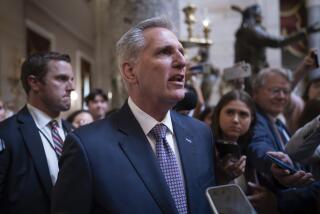AP Interview: Libya says Parliament will go past deadline
- Share via
UNITED NATIONS — The leader of Libya’s parliament says the elected House of Representatives will continue talks past the Oct. 20 deadline for its mandate to expire if a peace deal with the divided country’s rival government isn’t reached by then.
Ageila Saleh, who represents the internationally recognized government in the oil-rich but chaotic North African nation, gave no sign that an agreement was near, even though the U.N. says the final draft of a peace deal was handed to both sides in recent days. He spoke to The Associated Press on Sunday evening on the sidelines of back-to-back U.N. gatherings of world leaders.
Smugglers have exploited Libya’s internal turmoil to ship thousands of desperate refugees and migrants on rickety boats across the Mediterranean toward Europe’s southern shores. It is just one of the issues jostling for attention as President Barack Obama, Russian President Vladimir Putin and others this week debate such crises as Syria, Yemen and the growth of extremist groups like the Islamic State.
The United Nations is pressing Libya’s rival governments — the other has the support of Islamist militias — to form a national unity government, which the international community believes is the first step toward addressing the migration issue and the growing presence of the Islamic State group. The country has been unstable since the 2011 overthrow and killing of longtime dictator Moammar Gadhafi.
In a striking statement Monday, President Barack Obama told a U.N. gathering of world leaders that an international coalition “could have and should have done more to fill a vacuum left behind” after Gadhafi was gone. Russia has repeatedly used the example of Libya to support its argument against international intervention in Syria.
Differences now remain between Libya’s two governments, and Saleh said his government wants the talks to “move a step forward.” He blamed the rival government, based in Libya’s west, for “delaying democracy and putting obstacles in front of the House of Representatives and the Libyan community.” He did not go into details.
U.N. special envoy Bernardino Leon wants a deal in coming weeks, before the mandate of the House of Representatives, based in the eastern city of Tobruk. The mandate expires next month under a political roadmap sketched out post-Gadhafi. Leon has described Libya as a country running out of money, with nearly 500,000 displaced people and about 250,000 migrants either in the country or passing through.
Speaking through a translator, Saleh made clear that the parliament would continue past that Oct. 20 deadline if needed.
But if a national unity government is reached, “that will end the problem,” he said. If not, “the world has to help.”
Alarmed by the flow of refugees and migrants from Libya’s largely unguarded coast and the deaths at sea along the way, European countries are backing a proposed U.N. Security Council resolution that would seize and destroy suspected migrant smuggling boats on the high seas. An earlier version of the draft resolution would have authorized such action in Libyan waters as well.
Saleh strongly rejected the idea of entering his country’s waters, calling it interference. Instead, he appeared to link a solution to the smuggling problem to his government’s persistent appeal to the international community for more weapons — which, the government argues, will also help it fight groups like the Islamic State.
“We didn’t get any support to stop this illegal migration and protect our borders,” he said. “We can protect our own borders and stop illegal immigration.” He called for more support for Libya’s navy, which government officials have described as underequipped.
A U.N. arms embargo on Libya means that the internationally recognized government has to ask for exemptions to import arms. Permanent Security Council members have blocked requests, however, amid fears that the weapons will find their way into the wrong hands.
Asked whether his government was forming closer ties with Russia and China because of its frustration with other permanent Council members over weapons, Saleh noted that Libya’s military in the past has trained in Russia and received arms from Moscow.
“We renewed these relations,” he said, without giving details.
“We will look for any way to arm our troops,” he added. “We can find a way.” He called the threat of groups like the Islamic State “a danger for the entire world.”
Despite friction with the United States over the arms embargo, Saleh said his government continued to cooperate with the U.S. on airstrikes in his country. And once peace is achieved in a ravaged Libya, he added, he hopes the U.S. will play a part in rebuilding it.
Copyright 2015 The Associated Press. All rights reserved. This material may not be published, broadcast, rewritten or redistributed.
More to Read
Sign up for Essential California
The most important California stories and recommendations in your inbox every morning.
You may occasionally receive promotional content from the Los Angeles Times.












